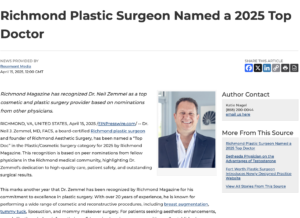Richmond Aesthetic Surgery is pleased to offer the following three financing companies: CareCredit®, Surgery Loans, and ChaseHealthAdvantage. Each company offers multiple repayment plans and a variety of interest rates. If you have any questions that are not answered fully by our financing page—please contact the companies directly—or feel free to call our office.
Financing FAQs
How is my interest rate determined?
The interest rate depends upon your treatment fee, repayment term, and credit standing. You can choose an 18, 24, 36, 48 or 60 month plan. The interest rate ranges from 1.99% to 23.99% APR.
Can I prepay my loan?
Most companies we finance through allow you to prepay your loan without penalty. So if you want to pay a little extra any month or pay off the entire balance early, you’ll minimize the amount of interest you pay.
What kind of information do I need to apply?
The process is fast and easy. You will be asked some very basic questions regarding residence and employment to help get you qualified. You must be at least 18 years of age to apply. You have the option of applying by telephone, fax, or online.
What is the minimum / maximum amount I can finance?
Financing is available for cosmetic procedures in many ranges—each company has different limits.
Is my loan paid to me or my doctor?
Your loan is paid directly to the doctor, you pay the finance company back on a monthly basis.
When should I apply for my loan?
You can apply anytime. Your loan is valid for a period of time as specified by the loan officer (typically around 90 days). Schedule your treatment within that timeframe. After the initial timeframe, you will need to reapply.
Can I pay a portion of my cosmetic fee and finance the rest?
Yes, you can pay the practice a portion of your cosmetic fee directly and finance the remaining balance.
Can someone else co-sign the loan?
Yes, the terms vary for each company—but all three financing institutes have co-signing options.
Insurance FAQs
Will Your Insurance Company Pay For Cosmetic Surgery?
Insurance companies only pay for surgery if it is not considered cosmetic surgery. Your doctor can give your insurance company documentation about your condition. This is a partial list of procedures that may be covered by insurance:
Abdominal Surgery, When It Is Performed To:
- alleviate health problems such as back pain, sores, hernia, rashes
- restore the ability to walk normally.
Breast Surgery, When It Is Performed To:
- correct congenital asymmetry;
- reduce overly large breasts that are causing health problems (shoulder grooving, neck and back pain etc.);
- reconstruct a breast lost to disease;
- correct congenital absence of breast;
- reduce over-developed male breasts – gynecomastia.
Ear Surgery, When It Is Performed To:
- correct congenitally deformed ears;
- reconstruct ears that are deformed by disease or injury.
Eyelid Surgery, When It Is Performed To:
- correct drooping of upper eyelids that are obscuring vision;
- correct out-turned or in-turned lower eyelids.
Facial Surgery, When It Is Performed To:
- correct an asymmetrical appearance caused by facial paralysis;
- treat conditions affecting the facial muscles lips and cheeks
- treat traumatic deformities;
- correct head and neck deformities.
Hand Surgery, When It Is Performed To:
- treat carpal tunnel syndrome;
- correct Dupuytren’s contracture, treat tendon & nerve injuries
- correct syndactyly (fused fingers) and other congenital deformities.
Nasal Surgery, When It Is Performed To:
- correct deformities resuming from birth defects or disease;
treat injuries or nasal deformities that may affect breathing
This list was developed with information obtained from the The American Society of Plastic Surgeons (ASPS).
